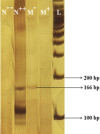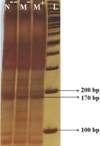Scrophularia Atropatana Extract Reverses TP53 Gene Promoter Hypermethylation and Decreases Survivin Antiapoptotic Gene Expression in Breast Cancer Cells
- PMID: 30256066
- PMCID: PMC6249477
- DOI: 10.22034/APJCP.2018.19.9.2599
Scrophularia Atropatana Extract Reverses TP53 Gene Promoter Hypermethylation and Decreases Survivin Antiapoptotic Gene Expression in Breast Cancer Cells
Abstract
Background: In many cases of breast cancer, the aberrant methylation of TP53 gene leads to uncontrolled cell proliferation and apoptosis inhibition. Moreover, expression of oncogenes which are under the control of P53 protein could be altered. Survivin as a conspicuous example of this category plays important roles in tumorigenesis, drug resistance and apoptosis inhibition. The present study was done to reveal the effects of Scrophularia atropatana extract on epigenetic situation of TP53 gene promoter and the expression levels of anti-apoptotic gene, survivin and its potential for production of cancer epi-drugs. Methods: Cytotoxic effect of dichloromethane extracts of Scrophularia plant on MCF-7 cell line was assessed in our previous study. Cell death ELISA (enzyme-linked immunosorbent assay) and TUNEL (Terminal deoxynucleotidyl transferase dUTP nick end labeling) tests were used to investigate the occurrence of apoptosis in the treated cells. Methylation Specific PCR (MSP) was employed to assess the changes in methylation status of the TP53 gene promoter. Furthermore, quantitative real time PCR was utilized to evaluate the resulting changes in TP53 and survivin genes expression. Results: Cell death ELISA and TUNEL assays confirmed the occurrence of apoptosis. MSP test revealed a significant change in the methylation status of TP53 promoter. QRT-PCR showed an increased TP53 gene expression in the treated cells while a significant decrease in survivin mRNA was evident. Conclusions: According to the outcomes, dichloromethane extract of S. atropatana returned the TP53 gene promoter hypermethylation to normal state. This plant could be a promising source for production of epi-drugs due to its apoptotic effects and reversal of TP53 epigenetic alterations.
Keywords: BIRC5; Epigenetics; P53; Scrophularia atropatana; survivin.
Creative Commons Attribution License
Figures





Similar articles
-
Dichloromethane fractions of Scrophularia oxysepala extract induce apoptosis in MCF-7 human breast cancer cells.Bosn J Basic Med Sci. 2015 Jan 29;15(1):26-32. doi: 10.17305/bjbms.2015.1.226. Bosn J Basic Med Sci. 2015. PMID: 25725141 Free PMC article.
-
The Cytotoxic and Apoptotic Effects of Scrophularia Atropatana Extracts on Human Breast Cancer Cells.Adv Pharm Bull. 2017 Sep;7(3):381-389. doi: 10.15171/apb.2017.046. Epub 2017 Sep 25. Adv Pharm Bull. 2017. PMID: 29071220 Free PMC article.
-
Growth inhibitory effect of Scrophularia oxysepala extract on mouse mammary carcinoma 4T1 cells in vitro and in vivo systems.Biomed Pharmacother. 2017 Jan;85:718-724. doi: 10.1016/j.biopha.2016.11.086. Epub 2016 Dec 4. Biomed Pharmacother. 2017. PMID: 27923691
-
p53 in breast cancer subtypes and new insights into response to chemotherapy.Breast. 2013 Aug;22 Suppl 2:S27-9. doi: 10.1016/j.breast.2013.07.005. Breast. 2013. PMID: 24074787 Review.
-
Epigenetic mechanism of survivin dysregulation in human cancer.Sci China Life Sci. 2018 Jul;61(7):808-814. doi: 10.1007/s11427-017-9230-2. Epub 2018 Jan 4. Sci China Life Sci. 2018. PMID: 29318497 Free PMC article. Review.
Cited by
-
OncoDB: an interactive online database for analysis of gene expression and viral infection in cancer.Nucleic Acids Res. 2022 Jan 7;50(D1):D1334-D1339. doi: 10.1093/nar/gkab970. Nucleic Acids Res. 2022. PMID: 34718715 Free PMC article.
-
MethHC 2.0: information repository of DNA methylation and gene expression in human cancer.Nucleic Acids Res. 2021 Jan 8;49(D1):D1268-D1275. doi: 10.1093/nar/gkaa1104. Nucleic Acids Res. 2021. PMID: 33270889 Free PMC article.
-
Evaluation of the Methylation of MIR129-2 Gene in Gastric Cancer.J Gastrointest Cancer. 2020 Mar;51(1):267-270. doi: 10.1007/s12029-019-00239-4. J Gastrointest Cancer. 2020. PMID: 31073863
-
Suppression of E6 Oncogene Induces Apoptosis in CaSki Cervical Cancer Cells.Asian Pac J Cancer Prev. 2023 Oct 1;24(10):3389-3395. doi: 10.31557/APJCP.2023.24.10.3389. Asian Pac J Cancer Prev. 2023. PMID: 37898842 Free PMC article.
References
-
- Almeida LO, Custodio AC, Pinto GR, et al. Polymorphisms and DNA methylation of gene TP53 associated with extra-axial brain tumors. Genet Mol Res. 2009;8:8–18. - PubMed
MeSH terms
Substances
LinkOut - more resources
Full Text Sources
Medical
Research Materials
Miscellaneous

